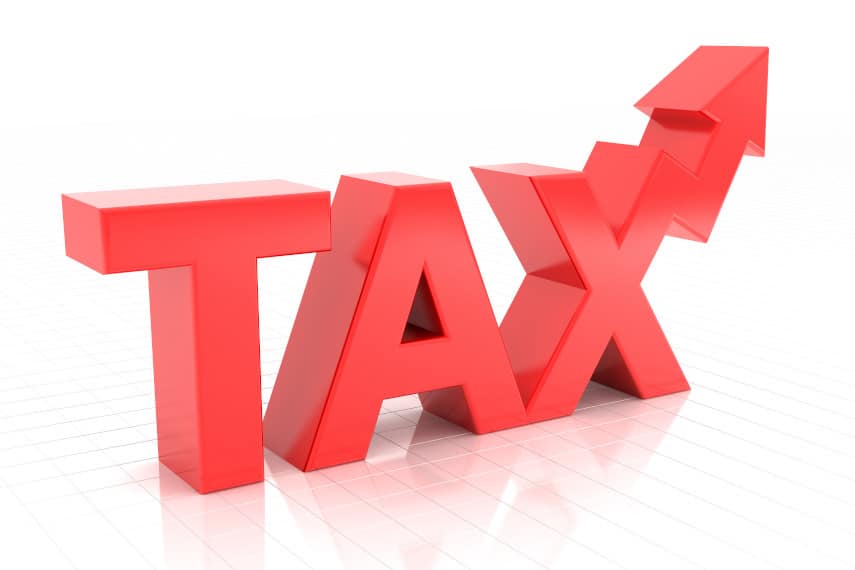Could Trump’s Tariffs Impact the Gold Price?
One of the key initiatives President Trump promised when he was elected was the implementation of tariffs on a wide variety of imports from numerous countries According to Trump, tariffs would, among...
Political

With a Democrat in the White House and Democrats in control of Congress, it perhaps shouldn’t be surprising that President Biden is starting to pull out all the stops to raise taxes. And one of his first moves is to try to stop American companies from escaping rising taxation.
The United States used to have one of the highest corporate tax rates in the world, and it wasn’t until President Trump took office that Republicans were able to make headway in reducing it. Now, with a 21% corporate tax rate, the US corporate tax rate is closer to the world average, and is lower than other industrialized nations such as France and Germany. But Biden wants to change that.
Biden has grandiose plans for his administration, and needs to come up with trillions of dollar of additional revenue to pay for it. While he doesn’t have any problem borrowing the money, he also wants to raise taxes so that he won’t have to borrow as much. And he’s looking to tax large corporations to do it. But rest assured, you as a taxpayer, investor, or customer will end up paying the final bill.
Biden’s proposal is not just to raise the US corporate tax rate to 28%. He also wants to make sure that US corporations can’t escape taxation by moving their operations overseas to take advantage of lower corporate tax rates abroad. To that end, Biden and Treasury Secretary Janet Yellen are working with the Organization for Economic Co-Operation and Development (OECD) and the G7 to implement a global corporate tax system in which the minimum corporate tax rate would be 15%.
Doing that would, in the eyes of Biden and Yellen, ensure that multinational companies couldn’t flee to so-called tax havens. And should any country decide to defect from the new tax regime, it would likely face punitive penalties in the form of sanctions or embargoes from countries that want to see the global tax regime survive. Whether we like it or not, we’re entering a new era in which governments around the world are no longer trying to stimulate economic growth and development, but are instead trying to siphon as much wealth away from the private sector as possible in order to pay for their grandiose spending schemes.
One thing that’s important to remember about taxation is that it’s always the end user who pays. If you think that it’s a good thing that large corporations are paying more in taxes, don’t complain when the prices of the goods you buy go up.
Companies will always pass on the cost of doing business to their customers, that’s just the way things work. If taxes and fees increase the cost of doing business, that increased cost will end up being reflected through higher prices on goods and services. So ultimately it’s you the customer who will pay the cost.
Investors will also pay because the increasing cost of business will reduce corporate profits. That could lead to lower dividends for those companies that pay them, and to lower share prices for stockholders. Multiply that across the entire economy, because all public companies will be affected by this new tax regime, and you end up with a policy that could likely depress stock prices.
And since the tax regime is supposed to fund trillions of dollars of additional government spending, not all of which will be paid for by tax revenues, taxpayers will ultimately pay an increased bill in the future when the bill for this additional spending comes due.
The moral of this story is that it is becoming increasingly difficult to hide your wealth from the prying hands of authorities. Those who have money are seen as piggy banks ready for the plundering. And that’s why it’s more important than ever to protect your wealth. The reality is that those with assets are likely going to see higher taxes in the future, which makes it vitally important both to build up your assets now but also to protect them against future taxation.
Many investors choose to take advantage of the various tax-advantaged accounts available to them to save for retirement. These include IRAs and 401(k)s, with many such accounts being available through employers. In many cases the contributions to these accounts are made from payroll deductions, keeping that money free from taxation until investors take distributions after they turn 59 ½.
With taxes potentially rising in the future, some investors will undoubtedly want to reassess their current investments. That could include doing a Roth conversion of existing retirement accounts, or looking to alternative investments such as gold and silver.
Gold and silver have the advantage of being tangible physical assets, so it’s far more difficult for the government to seize them than electronic assets such as bank account or retirement account balances. And with gold and silver’s ability to perform well during tough economic times, they could provide investors with gains even when other assets are flailing.
If you have existing retirement savings in tax-advantaged accounts such as an IRA, 401(k), TSP, or similar account, you can even roll over or transfer those assets to a gold IRA or silver IRA, allowing you to maintain all the benefits of your existing retirement accounts while investing in physical gold or silver. And when it comes time to take a distribution, you can take that distribution in cash or in physical gold or silver.
Protecting your retirement savings means being proactive and not waiting around. Don’t let tax increases catch you by surprise and take a chunk out of your hard-earned wealth. Call the experts at Goldco today to find out how gold and silver can safeguard your assets.

